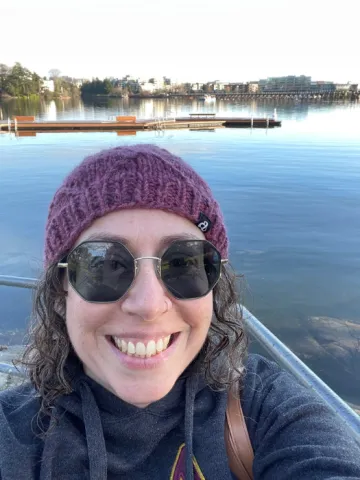
How Meara Brown Helps Her Patients to Speak Again

For most of us, the ability to speak is something we take for granted. For Meara Brown’s patients, however, communication is a skill they must relearn entirely. As a speech language pathologist specializing in laryngectomy care with Island Health, Meara restores voices—both literally and figuratively—by helping people who have undergone the removal of their larynx regain their ability to speak.
“I work in a very niche part of speech language pathology,” Meara explains. “My job is to help manage voice prostheses for people, teaching them how to use it so they can talk again.” This work, part voice restoration and part acute care, is critical yet underrepresented.
Meara didn’t start her career intending to work in health care. She first pursued a degree in modern languages and later worked a corporate job in Toronto. Underemployed and frustrated with her job, Meara was left longing for work with a greater meaning. Her mother, who always felt Meara would make a great speech pathologist, shared a heartwarming story about a family friend in the sector which led Meara to contemplate a career change.
“I was working for an advertising agency and I just couldn’t see any meaning in the work I was doing,” Meara shared. “And so I quit my job the week after, moved back in with my parents, and saved up some money to head back to university to get a grad degree.”
After returning to school, Meara discovered her passion for working in a hospital setting, where she has worked for the past 10 years.
A typical day for Meara is anything but predictable. In the mornings, she makes the rounds meeting patients in acute care. Afternoons might involve specialized interventions like conducting a videofluoroscopic swallowing study, mentoring other speech language pathologists, or tackling the ever-growing amount of administrative work that takes up a fair amount of her day.
Her role as the only full-time speech language pathologist specializing in laryngectomy care on Vancouver Island means she is often on-call for urgent issues. Patient emergencies don’t happen on a schedule, and they require immediate support, whether they live in Victoria or hours away in other parts of the island.
“I travel up to Nanaimo every two months to provide care to the patients up there, but if there’s an emergency, they have to come down to see me,” Meara says.
While her dedication to patients is unwavering, the job does come with significant challenges. Her caseload has doubled from the time she was hired due to an increase in the number of laryngectomies on Vancouver Island, and a lack of additional staffing has left her stretched thin. And while there are three other people on the island who have the training she does, two of them are casual and have jobs in other areas, and the third person is her supervisor.
“If I left, there would be nobody in the health authority who could take the job full time,” she explains. “The hospital would probably have to contract out and bring people over from the mainland. You can’t book laryngectomy care six weeks in advance.”
This pressure is compounded by the emotional toll of working in cancer care. “I build relationships with my patients and one of the hardest parts of my job is that people pass away,” she shares. “But helping people get their voice back so they can turn to their family and say ‘I love you’ really makes my work worthwhile.”
To ensure long-term, sustainable care, Meara believes in the need for more resources, especially positions to serve patients in the central and northern parts of Vancouver Island. She is also of the opinion that her patients ought to have care closer to them to alleviate the burden of travel and the difficulty of accessing emergency care hours away.
For now, Meara remains dedicated to her role, finding purpose in the connections she builds and the lives she impacts. “One of my favourite things to do is teach people how to voice again, and with laryngectomies I have to teach them a whole new way of speaking,” she says. “It’s especially great when they start to voice and their face lights up because they didn’t think they were ever going to talk again.”